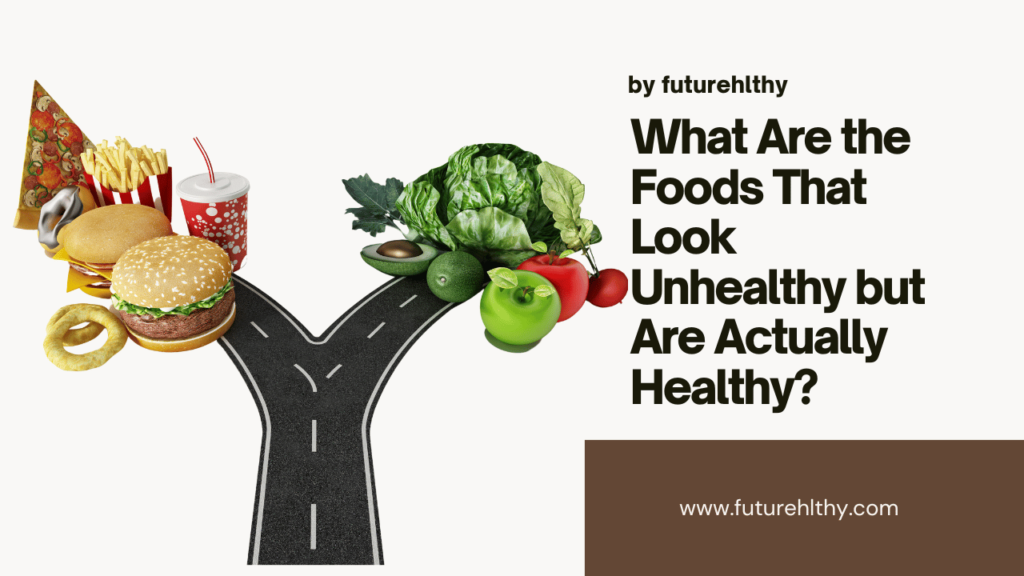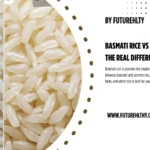What Are the Foods That Look Unhealthy but Are Actually Healthy?

When it comes to choosing the right foods for a healthy diet, looks can indeed be deceiving. In fact, some foods that might initially appear unhealthy can, surprisingly, offer substantial nutritional benefits. Furthermore, in this article, we will explore which foods look unhealthy but are actually quite healthy. Additionally, we will delve into 20 unhealthy foods to avoid and 20 healthy foods to include in your diet. Consequently, you’ll gain a comprehensive understanding of how to make better food choices for optimal health.
Foods That Look Unhealthy but Are Healthy
Here are some foods that might seem like guilty pleasures but are, in fact, good for you:
Dark Chocolate
Why It Looks Unhealthy: It’s often associated with sweets and desserts.
Why It’s Healthy: Dark chocolate, especially with 70% or more cocoa, is packed with antioxidants and can improve heart health.
Popcorn
Why It Looks Unhealthy: Popcorn is often served with butter and salt.
Why It’s Healthy: When air-popped and eaten plain, popcorn is a whole grain that’s high in fiber and low in calories.
Eggs
Why They Look Unhealthy: They’ve been criticized for their cholesterol content.
Why They’re Healthy: Eggs are a great source of protein and contain essential nutrients like choline, which is important for brain health.
Avocados
Why They Look Unhealthy: They are high in fat and calories.
Why They’re Healthy: The fats in avocados are heart-healthy monounsaturated fats, and they also provide fiber, vitamins, and minerals.
Nuts
Why They Look Unhealthy: They are calorie-dense and fatty.
Why They’re Healthy: Nuts are rich in healthy fats, protein, and fiber, which can help with heart health and weight management.
Coconut Oil
Why It Looks Unhealthy: It’s high in saturated fat.
Why It’s Healthy: Coconut oil contains medium-chain triglycerides (MCTs) that may boost metabolism and aid in fat loss.
Cheese
Why It Looks Unhealthy: It’s often thought of as high in fat and calories.
Why It’s Healthy: Cheese is a good source of calcium and protein, and it can be part of a balanced diet when eaten in moderation.
Potatoes
Why They Look Unhealthy: They are often fried or loaded with butter.
Why They’re Healthy: When prepared healthily, like baking or boiling, potatoes are full of vitamins, minerals, and fiber.
Peanut Butter
Why It Looks Unhealthy: It’s high in fat and calories.
Why It’s Healthy: Peanut butter provides healthy fats, protein, and fiber, making it a satisfying and nutritious snack.
Greek Yogurt
Why It Looks Unhealthy: Full-fat versions are often shunned for their fat content.
Why It’s Healthy: Greek yogurt is rich in protein, probiotics, and calcium, which are great for gut health and overall nutrition.
20 Unhealthy Foods to Avoid
When striving for a healthier diet, it’s important to recognize the foods that can do more harm than good. These 20 unhealthy foods are often loaded with sugars, unhealthy fats, and empty calories, which can lead to obesity, heart disease, and other health issues. Avoiding or minimizing these foods in your diet can significantly improve your overall well-being:
Sugary Beverages:
Drinks like soda, sweetened teas, and energy drinks are high in added sugars, contributing to weight gain and increased risk of diabetes.
Processed Meats:
bacon, and sausages are often high in unhealthy fats, sodium, and preservatives, which can increase the risk of heart disease and cancer.
Fast Food Burgers:
Typically high in saturated fats, sodium, and calories, fast food burgers can contribute to obesity and cardiovascular problems.
French Fries:
Deep-fried and often heavily salted, french fries are high in unhealthy fats and can contribute to weight gain and high blood pressure.
Candy Bars:
Packed with sugars, unhealthy fats, and artificial ingredients, candy bars offer little nutritional value and can lead to weight gain and dental issues.
Pastries and Cakes:
Often high in refined sugars, unhealthy fats, and calories, these baked goods can contribute to obesity and metabolic disorders.
Ice Cream:
While delicious, ice cream is typically high in sugar, saturated fats, and calories, making it a treat best enjoyed in moderation.
White Bread:
Made from refined flour, white bread is low in fiber and can cause spikes in blood sugar levels, contributing to weight gain.
Sugary Cereals:
Many breakfast cereals are loaded with added sugars and offer little nutritional value, leading to energy crashes and overeating.
Margarine:
Some types of margarine contain trans fats, which can raise bad cholesterol levels and increase the risk of heart disease.
Soda:
Regular consumption of soda is linked to weight gain, diabetes, and other health issues due to its high sugar content.
Potato Chips:
High in unhealthy fats, sodium, and calories, potato chips are a popular but nutritionally poor snack option.
Frozen Dinners:
Many frozen meals are loaded with sodium, unhealthy fats, and preservatives, making them a less-than-ideal choice for a healthy diet.
Packaged Snack Cakes:
These snacks are typically high in sugar, unhealthy fats, and artificial ingredients, offering little to no nutritional value.
Energy Drinks:
Often high in sugar and caffeine, energy drinks can lead to energy crashes, weight gain, and cardiovascular issues.
Pizza with Processed Meats:
Pizzas loaded with processed meats and high-fat cheese are calorie-dense and high in unhealthy fats and sodium.
White Rice:
While not inherently unhealthy, white rice is low in fiber and can cause spikes in blood sugar levels, making it less favorable than whole grains.
Sweetened Yogurt:
Many flavored yogurts are packed with added sugars, which can negate the health benefits of the yogurt itself.
Alcoholic Cocktails:
Mixed drinks often contain high amounts of sugar and empty calories, contributing to weight gain and other health issues.
Doughnuts:
High in sugar, unhealthy fats, and calories, doughnuts are a treat that should be enjoyed sparingly to avoid negative health impacts.
20 Healthy Foods to Include in Your Diet
On the flip side, there are numerous foods that offer incredible health benefits when incorporated into your daily diet. For instance, these 20 healthy foods are not only nutrient-dense but also packed with essential vitamins, minerals, and other beneficial compounds. Consequently, they support overall health and weight management. Furthermore, by including these foods in your diet, you can effectively contribute to disease prevention and improve your well-being.
Leafy Greens(Spinach, Kale):
Rich in vitamins, minerals, and antioxidants, leafy greens are not only beneficial for heart health but also contribute significantly to overall wellness. Moreover, by incorporating these nutrient-dense vegetables into your diet, you can enhance your immune system and support various bodily functions. Consequently, leafy greens play a crucial role in maintaining a balanced and healthy lifestyle.
Berries (Blueberries, Strawberries):
Packed with antioxidants, vitamins, and fiber, berries can help reduce inflammation and support heart health.
Salmon:
High in omega-3 fatty acids, salmon supports brain health, reduces inflammation, and promotes heart health.
Whole Grains (Quinoa, Brown Rice):
Whole grains are rich in fiber, vitamins, and minerals, aiding digestion and reducing the risk of chronic diseases.
Nuts (Almonds, Walnuts):
Nuts provide healthy fats, protein, and fiber, which can support heart health and weight management.
Olive Oil:
A staple of the Mediterranean diet, olive oil is rich in monounsaturated fats and antioxidants, promoting heart health.
Cruciferous Vegetables (Broccoli, Cauliflower):
These vegetables are high in fiber, vitamins, and cancer-fighting compounds, supporting overall health.
Legumes (Beans, Lentils):
Rich in protein, fiber, and essential nutrients, legumes are great for heart health and blood sugar regulation.
Sweet Potatoes:
Packed with vitamins, fiber, and antioxidants, sweet potatoes are a nutritious and versatile food.
Avocados:
Avocados are rich in heart-healthy fats, fiber, and various nutrients, making them a great addition to a balanced diet.
Garlic:
Known for its immune-boosting properties, garlic is rich in compounds that support heart health and reduce inflammation.
Turmeric:
This spice contains curcumin, a powerful anti-inflammatory compound that can support joint health and overall wellness.
Green Tea:
High in antioxidants, green tea promotes weight loss, heart health, and brain function.
Tomatoes:
Tomatoes are rich in vitamins, antioxidants, and lycopene, which can reduce the risk of certain cancers and heart disease.
Carrots:
Carrots are not only high in beta-carotene, but they also provide a rich source of fiber and essential vitamins. Consequently, they support eye health and contribute to overall well-being. Moreover, the antioxidants in carrots help combat free radicals, further enhancing their benefits for maintaining good health.
Yogurt:
Yogurt is a good source of probiotics, protein, and calcium, promoting gut health and bone strength.
Chia Seeds:
Chia seeds are packed with omega-3 fatty acids, fiber, and antioxidants, supporting heart health and digestion.
Dark Chocolate:
Rich in antioxidants and lower in sugar than milk chocolate, dark chocolate can benefit heart health when consumed in moderation.
Eggs:
Eggs are a great source of high-quality protein and essential nutrients like choline, supporting brain and overall health.
Watermelon:
Hydrating and low in calories, watermelon is rich in vitamins, antioxidants, and amino acids that support heart and muscle health.
By focusing on these healthy foods and steering clear of the unhealthy ones, you can create a balanced diet that promotes longevity, vitality, and overall well-being.
see more : Simple Dinner Recipes with Few Ingredients: Quick, Delicious, and Effortless
Sources:
- Harvard T.H. Chan School of Public Health. (n.d.). The Nutrition Source. Harvard Nutrition.
- Mayo Clinic. (n.d.). Healthy Diet. Mayo Clinic.

Taylor Green
Taylor Green writes about balanced eating, meal planning, and evidence-based nutrition tips. Their goal is to make healthy eating simple and achievable for everyone.






